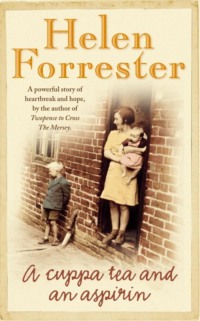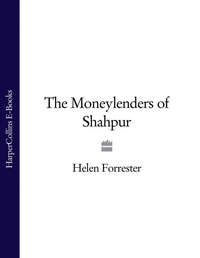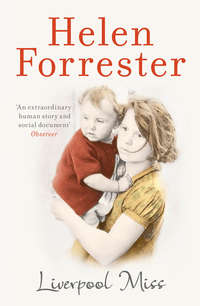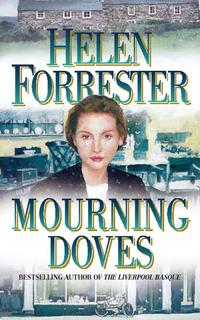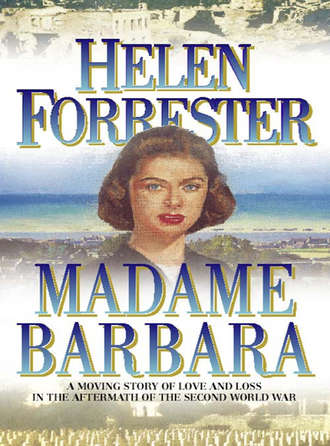
Полная версия
Madame Barbara
Since there were no officers with any of these groups, Michel assumed that they were deserters. He felt that since they had nothing to lose, they were probably much more dangerous than the more orderly units they had seen.
The tiny band of refugees, unanimous in their fear of the plunderers, edged in and out of nearby lanes or scattered through the hedgerows to avoid such menaces, and when they had passed, whispered to each other that they had never expected this of the Allies. ‘Worse than the godforsaken Bodies,’ one man said.
‘Every army has some criminals in it,’ replied an exhausted elderly man with almost saintly acceptance. ‘Saw it in the Great War.’
That evening, filthy, blood-bespattered, foodless and footsore, they walked into Bayeux, which looked blessedly normal after what they had seen en route, though there were crowds of civilians as well as military personnel in the streets.
While shocked passers-by, both troops and civilians, stared at them, Madame Benion looked at her son and mourned, ‘Whatever shall we do?’
Michel had been thinking about this, as they struggled through the ruined countryside, and he replied, ‘Find a church. The priests will surely be helping refugees. There must be some kind of help for people like us. Or the hôtel de ville?’
His mother was reeling with exhaustion. ‘Find a church,’ she muttered. She had a real distrust of French officialdom in the shape of a town hall with which she was unacquainted.
And now, as he smoked his second Gauloise and waited for Barbara Bishop, Michel was again thankful for the monks into whose hands they had literally fallen, too weary and hungry to go another step.
His mother had been put to bed in a narrow cell, where she had remained for a week until her skin had begun to heal. Her grief at the loss of her home was beyond healing.
Chapter Five
When Barbara looked down at the neat white cross which indicated the last resting place of Private George Bishop, 6th Batt., East Lancashire Regiment, died 27 July 1944, aged 28 years, she felt the same stunned emptiness she had endured when she had first heard of his loss through the War Office.
The gardener watched her from a discreet distance. One never knew how these women, whether mothers or wives, might react. He had had some who had flung themselves onto the wet grass and had lain there, crying for hours. Others had had hysterics and screamed so hard you could have heard them in Tessel. Still others came and went without a word, their expressions frozen into grim endurance.
Fathers occasionally came alone, to stand uneasily before a cross, tears running silently down their cheeks. Frequently, they wore their own medals, won in the First World War, as if to identify themselves as sharing the suffering of their boy who lay beneath the sod.
Barbara made no noise, though tears ran down her face.
When she felt steadier, she kneeled down on the damp lawn and carefully laid the flowers in front of the cross, tucking them close round its base, as if tucking a baby up in bed.
She felt she should say a prayer, but if God tolerated the horrors represented by this single white cross, He must be insane and would not understand her prayer or her dire need for comforting. There was no point in praying.
Given different times, she thought with a burst of anger at fools who made war, George could have been watching a football match with the Germans on the other side of this carefully groomed cemetery. What was it about men that allowed them to be led by the nose into ghastly cruelty against each other? It didn’t make sense.
These days, nothing made sense. The war was over, but George would not return; at home on Merseyside, each cold and hungry day seemed worse than the previous one. And this French countryside of shattered, deserted villages and towns had shocked her beyond measure. In the glory of a successful invasion, and the Allies having at last beaten the Germans, she realised that few people in England had given a thought to the suffering French civilians who had been caught in the middle.
She looked again at the cross before her. Is this how her mother had felt when her seaman husband had drowned in the Atlantic in 1941, his freighter sent to perdition by Germans, may they rot in hell? Mam had looked like a ghost for over two years. Even now, she was not the same woman who had kissed him goodbye before his last voyage; she had aged immeasurably.
The hopeless tears increased, running down Barbara’s face to drip onto her flowered scarf.
She had not felt so alone in her entire life.
From his seat on the step of the taxi, the driver observed her a little anxiously. Her face had blenched as if she might faint. Then he saw that Jules was watching her, ready to go to her if needed.
A solitary ray of sunshine lit up her shaking shoulders, her white, set face bent over the flowers, her hands clasped in her lap, as she finally sat back on her heels and bowed her head in helpless submission to forces beyond her control.
Death is truly the end, thought the apprehensive driver. There is nothing you can do to reverse it. As he frequently did, he silently cursed the name of Adolf Hitler and all his German brood.
After about five minutes, Barbara crossed herself mechanically, and then stumbled to her feet. She stood looking down at the flower-bedecked grave for a moment, heaved a mighty sigh, and said to it in a tremulous voice, ‘Goodbye, luvvie. Goodbye, my dearest.’
She raised her eyes and saw Jules staring at her as he stood diffidently by the gate at the edge of the lawn. He smiled gently. Like a priest, he saw daily so much sorrow.
She forced herself to gather her wits together. ‘Thanks, Monsieur Jules,’ she said heavily in faltering French. ‘Thanks for keeping the grave so well.’
She turned slowly back to the taxi. Realising that many of George’s friends must be buried around him, she picked her way carefully between the crosses, anxious not to step on anyone.
Before she reached the taxi, she paused and gave one last, long look back. Then she slowly turned away.
She took a handkerchief out of her sleeve and carefully wiped her face clean of tears. With dead eyes, she observed the patient driver hastily rise from his seat on the step of the taxi. She did not say anything as she approached him.
‘Madame wish the hotel?’ he enquired softly. He put his arm lightly round her to guide her to the taxi door.
‘Yes, please.’ Where else to go? What else to do?
She had allowed sixteen days for her visit to Normandy itself. She had planned that, after seeing George’s grave, she would have a walking holiday, exploring Calvados. She had never in her life had a real holiday and she had a vague hope that fresh air and good food would help to restore something of her pre-war energy.
But she had not allowed for this abject sense of loneliness, of desolation; and now, as far as she could judge, it seemed that most of Normandy had been wrecked – wrecked by armies sent to free it. The suffering it must have caused; it did not bear thinking about. To have visitors like her stare at it all must make the Normans feel that they were being reduced to a tourist attraction.
Now all she wanted to do was to lie down and be very quiet until she gained the strength to face, if she could, the rest of her empty life.
As the taxi driver cautiously shifted gears, she leaned her head back against the upholstery. Helplessly, she began to cry in earnest, deep rending sobs torn from her very heart.
Michel glanced back at her. He was tremendously disturbed by her obvious grief; she was too little, too pretty to suffer like this.
‘Madame, chère Madame, please don’t cry,’ he implored. He was weeping himself, for himself, for all the hurt people he carried in his taxi, and particularly for the nice young woman behind him.
She barely heard his plea, though she did try to muffle the noise she was making.
‘Please, please don’t cry, Madame.’ He paused while he aimed the vehicle carefully through the cemetery gates and onto the lane leading from it. Then he tried again.
‘Believe me, Madame, if I own this taxi, I marry you myself!’ He sighed. ‘Hélas, Monsieur Duval own it.’
There was a sudden cessation of the sobs, as the humour of the practical remark struck Barbara; the hard common sense of a presumably penniless young man anxious to help. She laughed through her tears, but after a second or two, she leaned forward and laid her head on her knee and commenced more quietly to weep again.
The taxi was carefully slowed, as the penniless one found that, with eyes clouded by tears, he could not see the road properly. He felt he too had reason to weep. Was not his own life shattered?
‘I stop,’ he announced. ‘We sit down on grass. We smoke, eh? We are better. Then nobody at the hotel stare at you.’
She did not answer.
He sniffed and wiped his nose on his sleeve. Then he drew in to the side of the road. A drainage ditch ran alongside the asphalt; beyond it was a grassy bank, shadowed by a huge hedge.
He jumped down and opened the door for Barbara. ‘Come, Madame,’ he urged persuasively. ‘We rest. You become calm before we go to hotel, eh?’
Numbly, she allowed herself to be helped out. She looked uncertainly down at the ditch.
‘Jump,’ Michel instructed, gesturing towards the grass on the other side. He himself cleared the ditch as effortlessly as a circus performer, and held out his hand for her to grasp.
In her flat-heeled shoes, the ditch was no real problem. Barbara held his hand and jumped. As she landed, he put his arm quickly round her waist to steady her. It was instinctive on his part.
To her, it was an unexpected shock, not because he seemed presumptuous but it gave her a sense that somebody cared enough to do so, even if that person was a total stranger.
In and around the docks, where she had toiled through the war and even since peace had been declared, she had often hit out at men who, in her widowhood, felt she was fair game, and had importuned or otherwise harassed her with their coarse familiarity. Now, as she still shuddered with sobs for her husband, she felt the warmth of the slim, tired-looking stranger beside her, smelled the strong tobacco and male sweat of him, and she was honestly grateful for his sober, sensible presence.
He eased her round and sat her down on the grassy bank. Then he sat down cross-legged in front of her, so that he could look straight at her face. He fumbled under his jersey and brought out his precious packet of cigarettes and a box of matches.
‘Smoke?’
There were only three cigarettes left in the packet, and she hesitated; cigarettes were hard to obtain, and like gold in her particular English village.
He smiled and thrust the package closer to her. She heaved a sob, and then helped herself. He struck a match and held the light to her cigarette.
The lines on his face deepened and his brown eyes twinkled as he endeavoured to cheer her. ‘Cigarette good,’ he said firmly, as she inhaled the strong acrid smoke of a Gauloise.
She coughed, and smiled tremulously.
She watched him stick a cigarette in the corner of his mouth and light it. His face shone wet in the light of the tiny flame, and she realised with astonishment that he had really been crying. She wondered, with a feeling of profound compassion, if, in addition to the loss of his farm, he had lost someone in the war. Perhaps his fiancée? He had mentioned a fiancée’s parents on the way to the cemetery. He had not directly mentioned the lady herself.
Chapter Six
For a while they sat in silence. As she smoked, Barbara’s sobs slowly decreased, became dryer and finally came to an end. Occasionally, she sighed shakily.
The persistent drizzle of the morning had stopped, though the sky was still overcast. Damp from the grassy bank on which they were sitting slowly seeped through their clothing. Neither of them, however, seemed inclined to move. A few trees, interspersed with huge hedges behind them, offered a protective canopy in the wrecked countryside.
Except for an occasional raindrop falling and the breeze rustling through the heavy foliage, it was very quiet. No traffic passed them. It was as if they were suspended in space, insulated for a few minutes from a world destroyed.
Barbara took out her handkerchief again and carefully dried her face, while Michel watched her through the tobacco smoke. She looked ruefully at her handkerchief, pink-stained with smudged makeup.
‘I must look awful,’ she said apologetically.
‘But no,’ he reassured her. He smiled slightly and continued to look at her gravely. His eyes, sad now, reminded her suddenly of her golden retriever at home, who, if anyone cried, would lay his head on the sufferer’s knee and gaze up at her in similar compassionate communion. Throughout the war, Simba had had to do a lot of comforting of both her mother and herself. He had done his best with Ada, George’s mam, too, when she came to sit in their kitchen and have a cup of tea and stare emptily into the fire.
Now, she had a stranger seated before her, trying to do the same thing, to comfort her and – she had a sudden flash of insight – to be himself comforted.
The persistence of his gaze compelled her to look back at him and smile a little. She wondered what else he had been through to cause the multitude of lines on his face, the patient resignation in his attitude, as if there were no reason to hurry back to the cold real world, plenty of time simply to sit and recover what one could of one’s sanity. Apparently impatient American morticians could wait.
At the remembrance of the Americans waiting for their taxi in the American cemetery, Barbara felt compelled to move.
‘Oh, dear me, I forgot. You have to collect your Americans.’
Michel leaned forward slightly and put his hand on her arm to restrain her. ‘There is much time, chére Madame. Rest a little longer. The Americans work as long as there is light – perhaps two more hours. And they are not far distant.’
He drew on his cigarette. ‘They stay in your hotel. I collect them en route. OK for Madame?’
‘Me? I don’t mind. They look like nice fellows. I saw them at breakfast this morning.’
She smiled at him, woebegone, her cigarette smouldering between her fingers, and he continued to sit quietly with her, to give her time to regain her equilibrium.
The Americans are generous, he thought. He had, however, grave doubts about how they might behave with an unescorted young woman; Americans seemed to have pockets full of nylons and piles of chocolate bars with which to seduce unwary females. It distressed him to think that his pretty passenger was herself wearing a pair of nylon stockings. That she might have bought them on the black market, which flourished as merrily in the port of Liverpool as it did in France, did not occur to him. Nevertheless, despite her obvious fall from grace, he would be in the taxi to protect her, and would see her safely into the hotel foyer.
He was not in the least afraid of three very tall, out-of-condition Yanks. Though he himself was so thin and had a hunched left shoulder, he had a long reach, which he found very useful when defending himself. Was he not a very effective kick-boxer, a master of old-fashioned savate, so quick on his feet as to be respected by all? The Americans did not seem to be aware of this particular art, and knowledge of it gave him considerable confidence when he met them in the streets of Bayeux, rather drunk – and where did they get enough to be drunk on, he’d like to know? The Boches had not left much worth drinking. Fortunately, Michel had never got into a real fight with them; sheer weight would very likely have overcome any skill he had.
While enduring the humiliation of the German occupation, it had been essential not to draw attention to oneself and to accept every obscenity without a word of response. It was a relief nowadays to feel that you did not have to salute or otherwise show respect to the Americans when some of them were drunk or abusive.
With regard to Barbara, such a respectable woman, he finally decided, could have come by her nylons legitimately; someone in the family might have brought them home as a gift. He hoped he was right.
He found her gentle, particularly now that she had lost her look of self-confidence and was crushed by grief. She appeared to have no pretensions and to treat him as an equal. The way she had given that choking, good-natured laugh at his remark about not being able to marry her suggested that a ready sense of humour might lie beneath her tear-soaked exterior; under other circumstances, he sensed she would be great fun.
He thought of her in her hotel bedroom, crying silently all night. He wanted to prevent this, if he could, by easing her into a better mood before he let her go. She was much too nice to be left to weep.
In the back of his mind he considered that probably the most comforting thing he could do for her would be to accompany her to bed. But he did not want to offend a foreign lady; and there was, of course, the practicality of the fury of Monsieur le Patron, if Michel were found in one of his hotel bedrooms.
Also, Englishwomen were notoriously faithful; she might feel she must be faithful to her dead husband.
He was astonished that he cared enough that he wanted to be careful what he said or did. What did it matter? She would be gone in a few days’ time, and he would be driving other widows with the same polite indifference that he had driven previous ones. Except that this little lady was different.
He sensed that to a man like himself she could give real pleasure. He felt free to consider this point, since his own love life was, after all, absolutely nonexistent at present; so he could honestly let his thoughts stray.
Finally, as he regretfully stubbed out his cigarette, he had an inspiration about taking her mind off her sorrow. He asked her if she had seen any other parts of Normandy. ‘Not all of it is damage,’ he assured her.
She gave a shivery sigh. ‘Yesterday I walked down to Arromanches, to see where some of the British troops landed. I saw the remains of the floating harbour we built.’
He was astonished. ‘A long walk, Madame!’
‘Not really. I found a little café there and had an omelette, and rested – and then walked back. It was late by the time I returned, of course.’
‘Bravo!’ He was impressed.
She gave a little shrug; she had hiked before the war, and the hard toil she had endured during the war had made her muscles strong. Even the steady physical work she did in her mother’s bed-and-breakfast provided daily exercise.
‘I’ve still eleven full days here,’ she confided, ‘if I want to use them.’ She looked up at him suddenly, and said with more enthusiasm, ‘You know, I would really like to see Caen, because George died on a bridge across the river during the battle for Caen. His friend told me.’ She paused, and then said with bitterness, ‘I want to know what kind of a city was worth his death – and thousands of other English lads.’ Her face twisted in renewed pain.
He thought she was about to cry again, and did not answer her for a moment. Then he said reflectively, ‘Caen is still ruin, Madame. Streets are clear. A few people try to make new life.’
She replied absently, her mind deflected as she pictured narrow bridges choked with dead soldiers, ‘Is it very difficult for them to have to start again? Is it all destroyed?’
‘Yes, Madame, practically all of it is. They are without much help. You understand, the Government give plenty attention to the big ports – lots of votes. Very little thought to smaller cities like Caen – and nothing to small farmers like myself. Peasants’ votes are not in one place – we are spread out. So not much power.’
He was back to his earlier complaints. He shrugged, and sighed. Then he added more fairly, ‘Government must also repair all the roads, the railways, the airports of France – much bomb damage by Allies. But here we all wait – and hope. The railway train now come to us – that is something.’
Then, as a detail which might amuse her, he told her that the churches that William, King of England and Duke of Normandy, and his wife, Matilda, had built in Caen, in thanksgiving for the Norman conquest of Britain in 1066, were still there, practically undamaged. ‘The Duke and Duchess thank God for victory and they build good. Those churches last nearly a thousand years – through many wars, many invasions.’ He grinned suddenly at her, as if the churches’ survival of the recent conflict was something of a joke.
He had recaptured her interest. ‘Really? How strange.’ She appreciated the irony of the survival of the churches after such a huge British bombardment during a reverse invasion.
He grinned. ‘British miss good chance to revenge on William – bomb them!’
There was a slight movement on the other side of the empty road, and Michel glanced across. On the verge opposite sat a rabbit, its nose quivering. Suddenly it vanished into the hedge.
He was diverted. Wildlife is returning, he reflected with a gleam of hope.
He looked again at the young woman opposite him, and said impetuously, ‘I take you to Caen tomorrow. Americans go to Paris for the weekend. We go, yes? Take a little lunch? Look around.’
‘How much would it cost? I owe you already for this trip. I had thought I would walk round the countryside. I’m a good walker and the distances are not very great. I can do twenty miles in a day – easy.’
She would be safe enough walking, he considered, but Caen was a bit too far to do in one day. Worst of all, he would probably never see her again and, even though her stay in Calvados was to be very brief, he longed to talk with her again.
He responded quickly. ‘I take you. No charge. You pay me for this trip to the cemetery, and I do tomorrow free. OK?’ While she considered his offer, he went on, ‘I went there just after battle finish. And I take Americans once or twice. I believe most roads now clear.’
And when I went there the first time what a shock I had, he thought, fury surging through him once more.
Chapter Seven
From the moment he had first glimpsed the totality of the destruction which had hit his little poultry farm and that of the Fortiers, Michel had been worried to distraction about the fate of Suzanne.
He had had no direct news of her for nearly three months, though her parents had told him that they had had just a few letters from her before the invasion. He had promised himself then that he would, as soon as possible, go to see her, but his mother had not been able to manage the poultry farm alone, and he could not easily leave her. His first thought, once he was in Bayeux, was to try to get through to her employer, at the café where she worked, but he had no success. All lines were down.
He could not find her on any casualty list available to him in Bayeux, but he was told that, so soon after the Germans had retreated, the casualty lists were, sadly, far from complete. The Fortier family was listed as missing; Suzanne’s name was not included. This added to Michel’s fears that she might have been killed in Caen during the subsequent battle; it was said that one-third of the population had been killed and another third wounded.
Though the engagement had been arranged by their parents, Michel was fond of his lifelong friend who was to become his wife, and he racked his brains for further sources of enquiry.
Patiently, he had asked at the hospital in Bayeux, in case she had been brought in there. She was not listed. However, he was invited to visit a woman so traumatised that she had not yet been able to identify herself, in the hope that he might recognise her. The woman was so hurt that he was thankful that she was a stranger to him.



